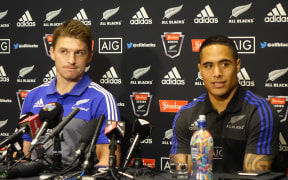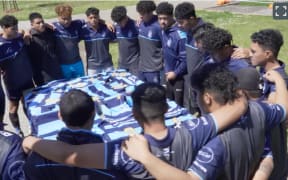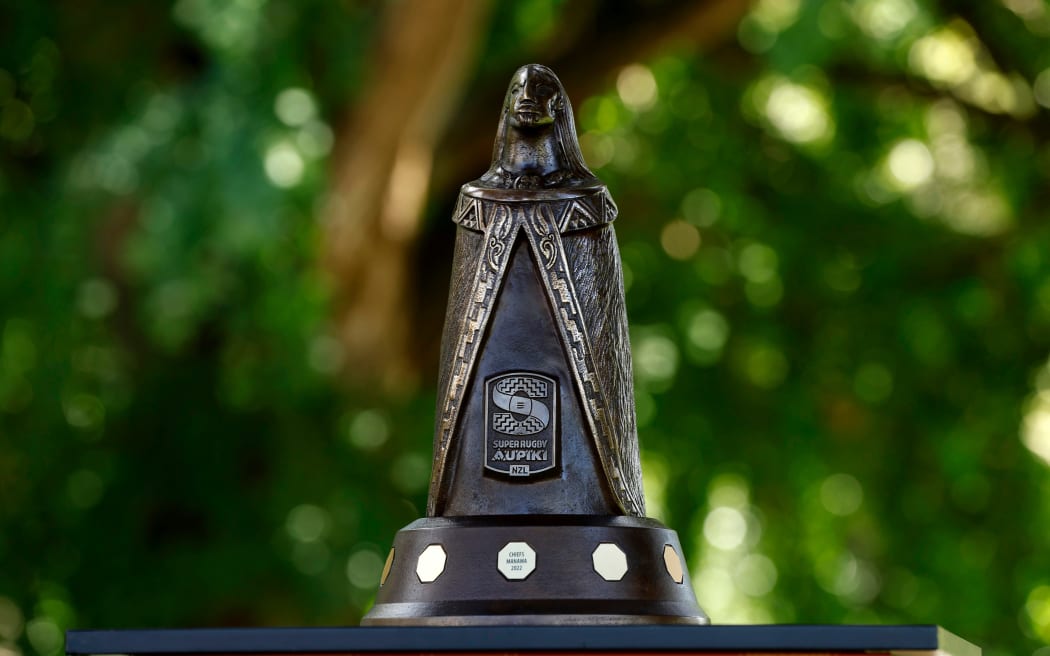
The Super Rugby Aupiki trophy. Photo: www.photosport.nz
It was fitting that the latest chapter in the Black Ferns' story concluded with another swag of silverware, this time at the Halberg Awards on Wednesday night.
The side was honoured with Team of the Year, Wayne Smith was Coach of the Year and Joanah Ngan-Woo's big lineout play to win the Rugby World Cup was voted by the public as the Sporting Moment of the Year.
None of those awards came as any great surprise to anyone.
That fact on its own may well be the biggest triumph for women's rugby after the dramatic on and off the field events over the last year and a half, with the team having captured the public's imagination in a way that even the most optimistic fan would not have dared dream of a year ago.
So, the question for those running the game really must be: what happens next?
Before Cyclone Gabrielle hit, Super Rugby Aupiki had its launch at Auckland's Eden Rugby Club. NZ Rugby chief executive Mark Robinson was in attendance after last year finally getting the crucial Silver Lake deal over the line, a development that has somewhat flown under the radar given just how massive it is for the women's game being professional.
"It feels a long way from where we were last year," Robinson said.
"The World Cup set the stage for this next step in the future of women's rugby. We've got a women and girls strategy coming out in the next couple of months and that will be a holistic look at the women's game - all the way from governance to management to high performance to the community game. There'll be a greater emphasis on coaching and delivering different formats for girls.
"You can't create the peak of the pyramid - the Black Ferns - without the support of Aupiki and the community game below it."
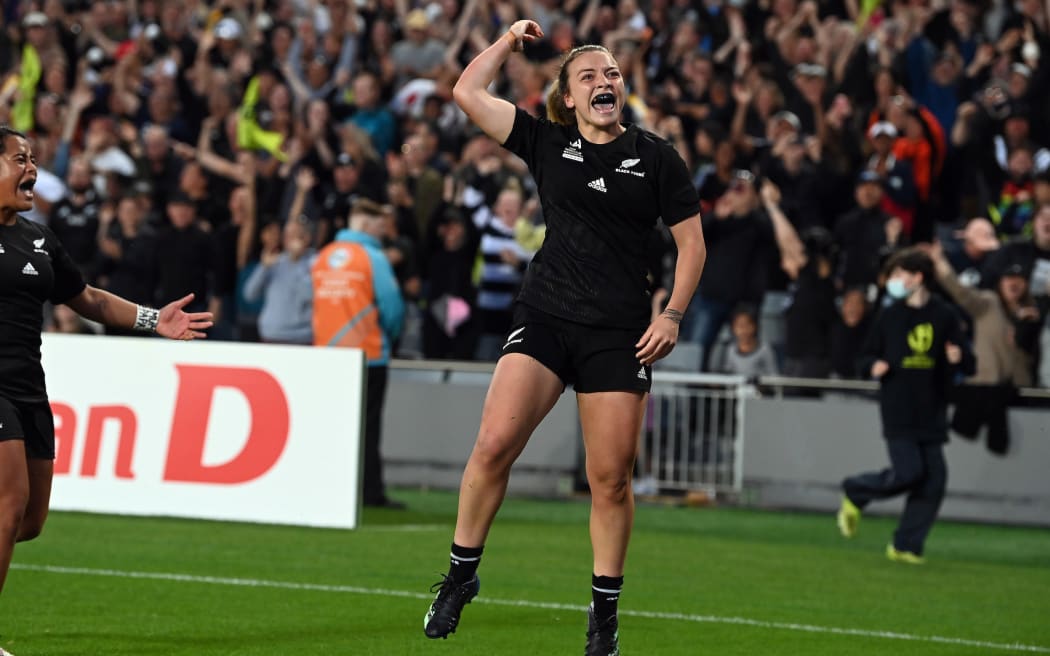
Renee Holmes of New Zealand celebrates her try during the Rugby World Cup final against England. Photo: Andrew Cornaga / www.photosport.nz
Aupiki kicks off this next weekend, looking in an awful lot better shape than its inaugural season.
Like the men's competition in 2022, it unfortunately caught the tail of government restrictions and the beginning of pretty much everyone getting Covid anyway.
Teams did not have the time to prepare properly and it showed. While there were a few nice touches from established Black Ferns, the quality was not much higher than the Farah Palmer Cup, with the Chiefs Manawa winning the competition by simply getting the ball to Portia Woodman-Wickliffe and Stacey Fluhler as quick and often as possible.
NZR are hopeful that the burgeoning professional environment will see standards lifted.
"We need a sustainable system to move forward with," said new NZ Rugby Women's high performance manager Hannah Porter.
"So that will develop both the players and the people working in women's rugby. While at the same time not taking our eye off performance and that we keep performing on the world stage.
"What are the critical things to be having to be able to make sure players are getting enough field position and skill sets? Are they fit enough to run the types of gameplans that the Black Ferns were running? Those are the sort of things we need to answer."
This is the inherent issue with Aupiki that has somewhat been an issue for women's rugby as a product for its entire existence. The fact that a lot of the elite level players are still learning to play the game is something that Porter is up front about but is confident that the plan is in place to change it.
"The women's pathway is not as linear as the men's," Porter said.
"But with the growth of the high-performance unit and how we grow that, we need to have a really targeted view. It's not going to happen overnight but give us that ability to develop those pathways and the people that are working to build them."
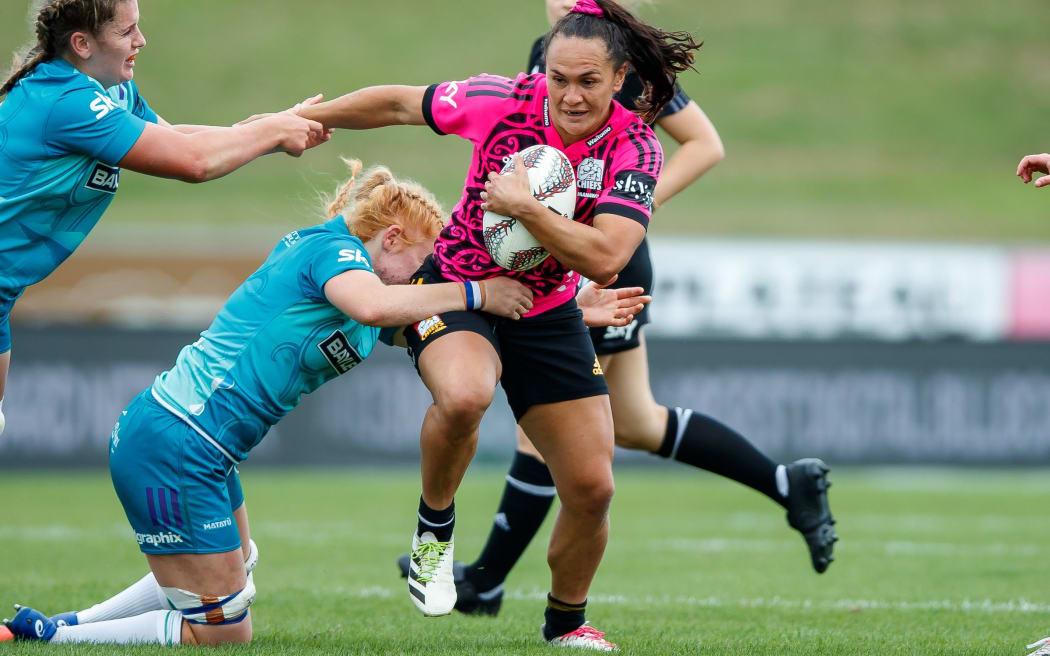
Photo: PhotoSport / Aaron Gillons
That is all well and good, but it does reveal a somewhat chicken-and-egg scenario. The reason why we are seeing plays like the Hurricanes Poua tossing their finals chances away because a player inexplicably grounded the ball back over her own line, or the chaotic nature of the Black Ferns' semi-final win over France, is because the players simply have not been exposed to enough high-pressure rugby situations thus far.
Just where they are going to get that experience before they make the move to professional rugby and being on TV is a huge issue that deserves its own column.
"What success would look like in the future is how we develop people and have their experiences through that pathway and make it to the elite level, they have been developed through the competitions that we offer. We don't have a huge amount of women playing at a senior level, though - around 3000," Porter said.
Then there is the eternal topic of balanced media coverage. It spoke volumes that the Aupiki launch was totally overshadowed by Scott Robertson's (wrong) guess on the same day that an announcement about the All Black coaching situation was imminent, something that really showed just how much daylight there is between the All Blacks and everything else in terms of sporting media attention.
Bear in mind that it is still February and whoever does get the job will not be starting it for another year, but that story still led every news site and sports bulletin.
To be fair, that is an issue for the men too.
If, a week out from starting, Super Rugby Pacific cannot sustain a stronger narrative than what an ill-timed utterance from Robertson can, then it faces a bleak future as a competition. Especially since the commitment from media outlets to properly staff their sports departments is at an all-time low, so meeting the expectation of giving Aupiki the coverage it needs to be a premium sporting product is a big ask, even if the will is there.
From a discourse point of view, women's rugby desperately needs to break out the closed loop of simply waiting to flog someone for saying something sexist or making a blunt instrument out of pay parity - especially when the latter is a far more complicated and interesting topic than just yelling 'pay them more'.
For now, there is no way for a Black Fern to ever earn as much as her All Black counterpart, even if NZ Rugby paid them the same rate throughout their entire careers.
One thing recent social media sports employment pundits (and there seemed to be an awful lot appear after the World Cup final) do not seem to realise is that the actual market where Ardie Savea, Beauden Barrett, Richie Mo'unga and a whole bunch of others are going to make their absolute maximum value as players just does not exist for women - at least, not yet.
The only real option to get paid to play outside of New Zealand is the NRLW, which is a different sport but one for which the door is wide open for any non-Black Ferns player to opt in and out of.
In fact, the lines are so blurred between the two codes that Katelyn Vaha'akolo had her social media announcement that she had joined the Blues Women happen during her Rugby League World Cup campaign with the Kiwi Ferns.
"The level of professionalism in rugby is very different to league," Vaha'akolo said, who spent last season with the Newcastle Knights and Auckland FPC sides.
"I've already been crossing codes, so it's something that's familiar to me. I'm open to switching, I've had a few word of mouth offers, so it's something I'd consider again."
Vaha'akolo said the experience of playing two sports professionally is something that is on the mind of her Blues team mates.
"The difference between resources between New Zealand and Australia, obviously league is huge over there and there's huge support for the women's game - so it's definitely something we talk about."
Aupiki will require some innovation to get it front of mind, but Vaha'akolo's situation shows that there exists a potential to cross-pollinate the market consistently in way that only happens sporadically for the men.
NRLW has just completed a new Collective Bargaining Agreement and does offer a way of keeping players like her in a professional environment for another big chunk of the season, so at 22, Vaha'akolo could potentially continue to jump codes in-season quite a bit as long as that loophole remains open.
"I didn't think this would be possible when I was younger, to have these pathways open and to be like Portia. It's very exciting."
We will see how Vaha'akolo and her Blues team does when they take the field next weekend, in a competition that is missing some of the biggest names from the Black Ferns' World Cup triumph.
The Sevens stars have returned to the abbreviated form of the game, while rugby's hottest property Ruby Tui will be commentating rather than playing. Again, it is not unprecedented, with Super Rugby Pacific once again having to deal with the fact that the All Blacks will be rested throughout as it is a World Cup year.
However, Super Rugby Aupiki 2023 is happening - on time, with a full schedule and with high interest in women's rugby. It is up to the players now to emulate the heroics of the Black Ferns and make sure people keep watching.


